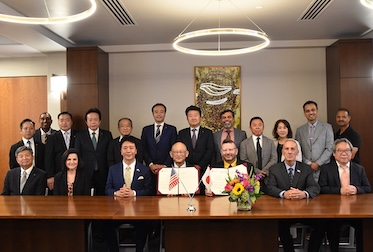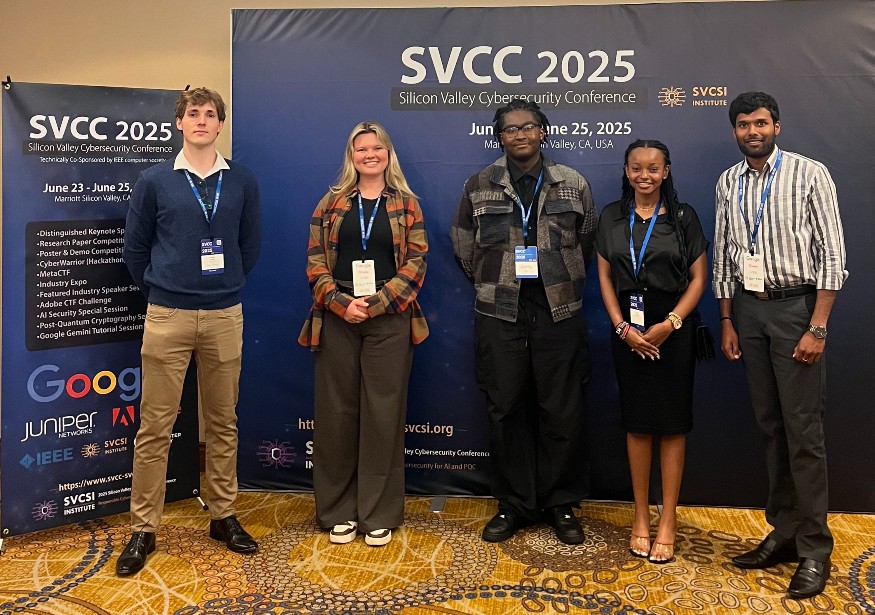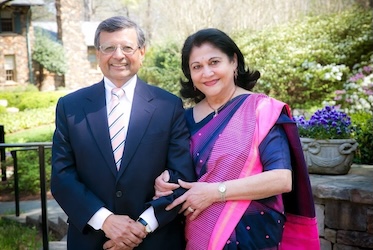

KENNESAW, Ga. | Jun 26, 2019
KSU student, professor helping set the standards
When information systems student Ryan Bishop spoke last week, the world was listening.
Bishop joined Kennesaw State University associate professor Dominic Thomas among the participants of a three-day International Organization for Standardization (ISO) meeting to establish systems and software maintenance guidelines in the maritime shipping industry.
Representatives from six countries – including officials from the largest shipping company in the world, Maersk – met for three days in KSU’s Prillaman Hall to discuss creating technology standards for devices on shipping vessels. These standards will give users easier access to diagnostic data and will help secure ships against cyberattacks. The attendees are all part of the ISO’s TC8 committee, which establishes rules governing international ships and marine technology.

Kennesaw State’s Modular Agile Development Lab, part of the Michael J. Coles College of Business, hosted the meeting. Thomas, who teaches information systems, and Bishop, a student in Thomas’ IS 3020 class, provided expert support on behalf of the American National Standards Institute.
The ISO consists of 164 standards-setting bodies from around the world working together to develop consistent rules governing all aspects of international trade. ANSI, which represents the U.S., chose Thomas and Bishop to attend as experts in systems processes and data interchange.
“Taking part in such a grand project is so exciting,” said Bishop, who will graduate next year. “I am serving as a representative for my peers and my mentors here at KSU. I hope my performance reflects the aptitude of those who attend this prestigious school.”
BIMCO, the world’s largest shipping association, recently submitted a draft to the ISO of proposed standards that would give users remote access to shipboard equipment statuses, allowing for real-time monitoring of everything from a ship’s radar and communications systems to its refrigeration units. Realizing the benefits, but also noticing some opportunities for improvement, Bishop and Thomas worked together for weeks to put together a series of recommendations.
The two also created a diagram outlining the potential flow of information, as well as a mock database for running simulations. They presented those items at the meeting.
“Dr. Thomas and I spent many hours discussing the possibilities of our recommended system,” Bishop said, “and I think the potential we envision will be realized by everyone who’s part of the project.”

Increased computerization in the shipping industry has created a pressing need for a single technology standard for logging and reporting critical shipboard information, according to Steve O’Malley, chairman of the ISO TC8 Committee.
“Shippers have to know exactly what software they are using,” O’Malley said. “Because if that software acts up, it’s going to affect everything they do. If they suffer a software crash, the ship is down for three days. That represents hundreds of thousands of dollars per day in lost income.”
O’Malley, who lives in Kennesaw and has a daughter enrolled in the Coles College, chose to hold the meeting at Kennesaw State after speaking with Thomas, who has worked on developing technology standards in other industries. Thomas recommended hosting it under the umbrella of the MAD Lab, an incubator for student researchers to develop new information system technologies.
Solomon Negash, director of the MAD Lab, said the meeting provided students – who were allowed to observe – with a unique look at the standards-creation process.
“The MAD Lab encourages hands-on learning for the KSU community,” Negash said. “Hosting the ISO standards meeting created an opportunity for students, faculty and staff to engage with industry practitioners.”
Along with the University’s growing prestige among the business community, the chance to inspire business students to develop an interest in standards was key to O’Malley’s choice to host the event at Kennesaw State. He said that young people rarely pay attention to the process, despite its significant importance to international business.
“The U.S. in general does not participate in international standards,” O’Malley said, “which puts us at a disadvantage. If you know what changes are going to happen, then you can change your business. I talked with Dominic about getting young people involved so they can understand where all the weird things they find in contracts actually come from.”
The meeting was the first in what could be a months-long process to develop and release a full set of technology standards governing shipboard devices. O’Malley said the committee could hold future meetings at Kennesaw State, but there are no plans at this time.
Thomas is optimistic that the meeting at Kennesaw State will be instrumental to the overall process.
“The hope is that during this meeting we will be able to get past general guidelines and arrive at the first releasable version for the standard that can enable a first wave of improvements,” he said.
— Patrick Harbin
Photos submitted

Kennesaw State and Fukuoka University sign agreement to expand global fintech education

Kennesaw State's Owl Cyber Team earns top finish in national cybersecurity competition

Kennesaw State alumna to compete in international Deaflympics games in Tokyo

Kennesaw State business students to benefit from the Madhuri and Jagdish N. Sheth Marketing Scholarship
A leader in innovative teaching and learning, Kennesaw State University offers undergraduate, graduate, and doctoral degrees to its more than 47,000 students. Kennesaw State is a member of the University System of Georgia with 11 academic colleges. The university’s vibrant campus culture, diverse population, strong global ties, and entrepreneurial spirit draw students from throughout the country and the world. Kennesaw State is a Carnegie-designated doctoral research institution (R2), placing it among an elite group of only 8 percent of U.S. colleges and universities with an R1 or R2 status. For more information, visit kennesaw.edu.